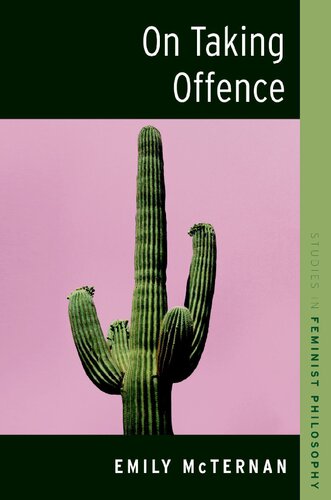On Taking Offence 1st Edition Emily Mcternan
$50.00 Original price was: $50.00.$25.00Current price is: $25.00.
On Taking Offence – Ebook Instant Download/Delivery ISBN(s): 9780197613108,0197613101

Product details:
- ISBN-10 : 0197613101
- ISBN-13 : 978-0197613108
- Author(s): Emily McTernan
Someone fails to shake your outstretched hand, puts you down in front of others, or makes a joke in poor taste. Should we take offence? Wouldn’t it be better if we didn’t? In the face of popular criticism of people taking offence too easily, and the social problems that creates, Emily McTernan defends taking offence as often morally appropriate and socially valuable. Within societies marred by inequality, taking offence can resist the day-to-day patterning of social hierarchies.
This book defends the significance of details of our social interactions. Cumulatively, small acts, and the social norms underlying these, can express and reinforce social hierarchies. But by taking offence, we mark an act as an affront to our social standing. We also often communicate our rejection of that affront to others. At times, taking offence can be a way to renegotiate the shared social norms around what counts as respectful treatment. Rather than a mere expression of hurt feelings then, to take offence can be to stand up for one’s standing.
Table contents:
Introduction
1. Taking offence: An emotion reconsidered
1.1. Philosophers on taking offence
1.2. An analysis of taking offence
1.3. Distinguishing offence
1.4. Rethinking offence: Domestic, not catastrophic
1.5. The limits of offence
1.6. Towards a defence: From victimhood to social standing
2. What taking offence does
2.1. Social standing and the role of social norms
2.2. Taking offence and reinforcing norms
2.3. Taking offence and renegotiating norms
2.4. In defence of negotiating social norms
2.5. On negotiating through offence
3. Do sweat the small stuff: The nature and significance of social standing
3.1. Between excess and deficiency
3.2. Social standing as an equal part I: Why the ‘small stuff’ matters
3.3. Social standing as an equal part II: The power to set the terms
3.4. In defence of the significance of affronts
3.5. Resisting by taking offence
4. The limits of justified offence: On anger, intent, and uptake
4.1. Anger, offence, and the act
4.2. Contesting offence
4.3. ‘But I didn’t mean it’: On intention and blame
4.4. ‘But that’s not offensive’: Disagreement and the offensive
4.5. When offence lacks uptake
5. Only joking!: On the offensiveness of humour
5.1. Theories of humour and the offensive
5.2. Some linguistics of jokes
5.3. How offensive jokes function
5.4. The riskiness of humour
6. A corrective civic virtue: Weighing the costs and benefits of offence
6.1. Offence as a civic virtue: Arguments from equality and civility
6.2. The costs of offence to the offending party
6.3. Justifying the costs of offence
6.4. Burdens on the offended
7. A social approach, our lives online, and the social emotions
7.1. A regulatory turn
7.2. Taking offence online
7.3. The social emotions beyond offence
Bibliography
Index
People also search:
ricky gervais on taking offence
emily mcternan on taking offence
taking offence on someone’s behalf
bible verses on not taking offence
offence is taken not given meaning
what is offence and penalty
You may also like…
Politics & Philosophy - Anthropology
Crime
(Ebook PDF) Enchanted Hill 1st edition by Emily Bain Murphy 1454949821 9781454949824 full chapters
Romance - Contemporary Romance
Romance - Contemporary Romance
Medicine & Health Science
Fiction - Contemporary Fiction
The Last Stargazers 1st edition by Emily Levesque 1492681083 9781492681083
Fiction - Contemporary Fiction
Romance - Other Romance Categories
Romance - Contemporary Romance
Book Lovers 1st edition by Emily Henry 0593334841 9780593334843













